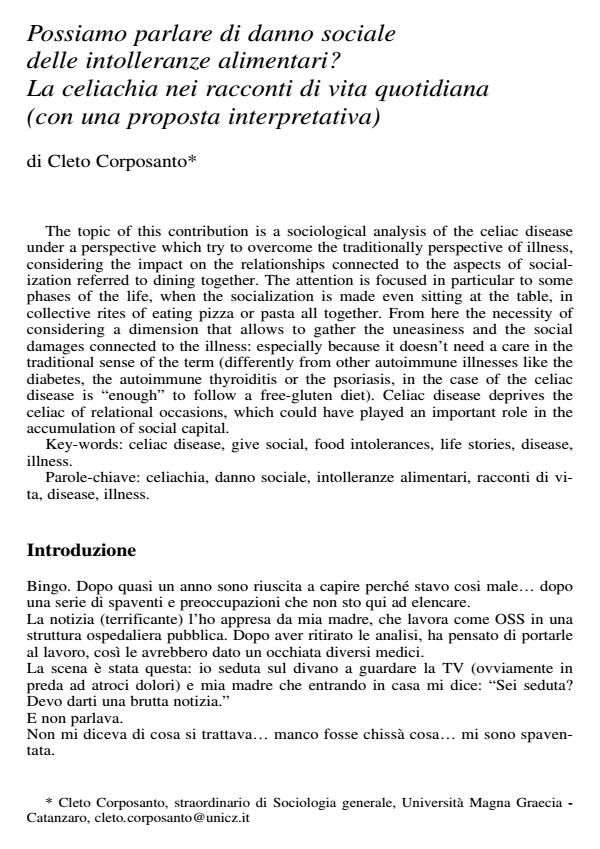Possiamo parlare di danno sociale delle intolleranze alimentari? La celiachia nei racconti di vita quotidiana (con una proposta interpretativa)
Titolo Rivista SALUTE E SOCIETÀ
Autori/Curatori Cleto Corposanto
Anno di pubblicazione 2009 Fascicolo 2009/3
Lingua Italiano Numero pagine 12 P. 142-153 Dimensione file 94 KB
DOI 10.3280/SES2009-003009
Il DOI è il codice a barre della proprietà intellettuale: per saperne di più
clicca qui
Qui sotto puoi vedere in anteprima la prima pagina di questo articolo.
Se questo articolo ti interessa, lo puoi acquistare (e scaricare in formato pdf) seguendo le facili indicazioni per acquistare il download credit. Acquista Download Credits per scaricare questo Articolo in formato PDF

FrancoAngeli è membro della Publishers International Linking Association, Inc (PILA), associazione indipendente e non profit per facilitare (attraverso i servizi tecnologici implementati da CrossRef.org) l’accesso degli studiosi ai contenuti digitali nelle pubblicazioni professionali e scientifiche.
Possiamo parlare di danno sociale delle intolleranze alimentari? La celiachia nei racconti di vita quotidiana (con una proposta interpretativa) - The definition of Intuitive Eating as a psychological construct was developed in opposition to dieting movements that proposed controlled meal plans, avoidance of taboo foods and restricted intake of fat grams and calories. An eating behavior more consistent with one’s internal physiological hunger and satiety cues was thus suggested in order to achieve both an adequate body weight and psychophysical well-being. Tylka (2006) developed the Intuitive Eating Scale (IES), a questionnaire that assesses three main facets of intuitive eating: unconditional permission to eat when hungry and what food is desired, eating for physical rather than emotional reasons, and reliance on internal hunger and satiety cues to determine when and how much to eat. This paper describes the development and validation of the Italian version of the IES. A paper-and-pencil battery that included a socio-demographical questionnaire, the IES and other measures of eating behaviour and attitudes toward food was administered to 206 participants and internal consistency, unidimensionality, factor structure and construct and criterion validity of the scale were investigated. Results showed that psychometric properties of the Italian version of the IES are adequate for the use in a non-clinical context. Future studies should investigate the temporal stability and the discriminant power of IES scores in clinical samples.
Key-words: intuitive eating, orthorexia, eating disorders, eating behavior, psichometrics.
Parole-chiave: intuitive eating, ortoressia, disturbi alimentari, comportamento alimentare, psicometric.
- La piattaforma online come strumento di rilevazione e fonte di possibili scenari interpretativi Beba Molinari, in SALUTE E SOCIETÀ 3/2014 pp.103
DOI: 10.3280/SES2014-003008
Cleto Corposanto, Possiamo parlare di danno sociale delle intolleranze alimentari? La celiachia nei racconti di vita quotidiana (con una proposta interpretativa) in "SALUTE E SOCIETÀ" 3/2009, pp 142-153, DOI: 10.3280/SES2009-003009